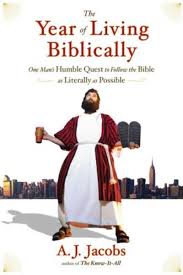 I recently picked up the book The Year of Living Biblically by A. J. Jacobs at a thrift store recently. After seeing it in book stores I had been interested in looking at it; some friends' recommendations reminded me of it again. So when I saw it for a couple bucks, I thought I'd pick it up (as if I needed more books for our library--why can't I just be content with checking them out from the public library more? I guess this way I have them to share with others, too).
I recently picked up the book The Year of Living Biblically by A. J. Jacobs at a thrift store recently. After seeing it in book stores I had been interested in looking at it; some friends' recommendations reminded me of it again. So when I saw it for a couple bucks, I thought I'd pick it up (as if I needed more books for our library--why can't I just be content with checking them out from the public library more? I guess this way I have them to share with others, too).Jacobs is a self-professed agnostic Jew (he admits that he's about as Jewish as The Olive Garden is an Italian restaurant) and editor for Esquire Magazine. He decided to try an experiment (partly to find out what he was missing by not being religious, partly to have better answers as a parent and mostly to have a new book to write) of following every command in the Bible--the major ones like those in The Ten Commandments, but also the lesser-known ones like not trimming your beard and not wearing clothes of mixed fibers.
I'm just starting the book, but it's quite fascinating (not to mention humorous in many places). Jacobs talks about trying to put into practice the commands about disciplining children. He has a hard time jumping in headfirst and "not sparing the rod." But he also realizes that his hands-off (so to speak) discipline isn't good for his son, nor is it fair to his wife.
He realizes how much he lies (just little, white lies often meant to have a good outcome--like get his son to eat his veggies) and how his son has picked up on lying. He realizes how much he covets (others' speaking fees, clothes, cars, etc.), and how distracting that is in his day as well as taking away from happiness in life.
He has a great outlook where he manages to find the good in each law--the underlying reasons why God created some of those laws for ancient Israel. While his wife isn't too fond of being considered "impure" once a month, and gets frustrated with Jacobs for not being able to sit on any furniture she has sat on, Jacobs learns that a week hiatus from touching his wife in any manner can actually strengthen their marriage (though his wife might need more convincing) and it is embedded with a respect for life. He has done the footwork in setting up mentors (rabbis and pastors) who can answer his questions and provide encouragement.
Even though I'm just at the beginning, it's evident that this year-long journey of following every commandment in the Bible isn't going to "convert" Jacobs (plus, I read some additional material at the end of the book in which Jacobs outright states that he still isn't a practicing Jew or Christian). But it's also very clear that he is being changed by this. He sees the value in moral absolutes (even coming from a moral relativism background) and wants to raise his son up with morals. He knows that following the commandments makes him a better person.
If anything, though, being legalistic about following the commandments actually causes Jacobs to think about God more. Now, I'm not advocating that we all become legalistic believers, but I wonder if we've gotten too lax in keeping the commandments (after all, in order to keep the commandments, you have to KNOW the commandments). I'll keep you posted as I continue reading--he's only into the second month of this experiment, so I'm sure there'll be more to reflect on.
2 comments:
I enjoyed reading this a few years ago. It made me think about why we still follow some of the "rules" but not others.
Yeah, I'm obviously not one to read the current hits. It takes me a few years. Plus, there are so many classics yet to read. Plus the frivolous books I read just because I enjoy them.
The distinction between ritual & ethical laws makes sense with Jesus fulfilling the sacrifice, but there are some laws we clearly just ignore.
Post a Comment